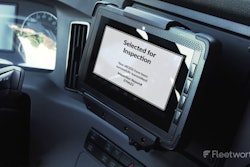After two trade groups representing CDL trainers in April called out the DOT and Federal Motor Carrier Safety Administration for not policing the "threat" posed by "unscrupulous training entities" on the Training Provider Registry (TPR), a crackdown may finally be underway.
But while FMCSA has now taken nearly 60 training providers off the registry, some of the schools themselves say they haven't offered CDL classes in years.
The criticism of the FMCSA came in a letter from the Commercial Vehicle Training Association (CVTA), which represents mostly privately funded CDL schools, and the National Association of Publicly Funded Truck Driver Schools (NAPFTDS), representing places like community colleges. The groups alleged that FMCSA wasn't taking complaints seriously or doing anything with the the reports they'd received.
The groups said they were "deeply concerned that enforcement actions have not kept pace with the threat posed by non-compliant and unscrupulous training entities," which they dubbed "bad actors" who "undermine the integrity of the driver training community, exploit prospective students, and jeopardize public safety by putting inadequately prepared drivers on the road."
[Related: CDL schools call out 'threat' of 'unscrupulous training entities']

At the time of the letter, only four training providers had been removed from the registry since 2023, three of which came under emergency conditions. Additionally, only 25 schools had been issued Notices of Proposed Removals, despite "hundreds of complaints made by citizens and state agencies," according to the letter.
Since then, FMCSA has taken almost 60 CDL training facilities off of its TPR. Per the 2022-implemented Entry Level Driver Training (ELDT) rules, prospective CDL drivers must train with one of the entities in the TPR before they can take the skills test and obtain the license.
NAPFTDS Executive Director Martin Garsee, a member of the ELDT advisory committee convened in 2015 and an owner of a CDL school in Houston, Texas, said he'd met with top FMCSA leadership who assured him they'd "clean up" the TPR following the letter.
Yet Garsee pointed to some geographic clustering as an issue with the TPR cleanup thus far. Of 57 training providers removed, 47 came from Michigan, Rhode Island, Ohio and North Carolina. Alaska, Georgia, Alabama, Wisconsin and Texas providers all appeared on the list as well.
"The other 40-something states are not reporting to FMCSA" schools that need removal, Garsee said.
Overall, the TRP cleanup is "not near enough" to address the issues raised by the letter, Garsee said, and Overdrive reporting suggests many of these schools hadn't been open for business for years. One CDL school said they hadn't taught CDL classes there since October of 2022, the year the ELDT regulations came into effect. That school was listed as having been involuntarily removed from the TPR.
Other outfits listed as removed were active and inactive fleets, who might have had internal CDL training programs. One CDL trainer in Michigan said he'd voluntarily removed himself from the TPR, but FMCSA had him listed as being involuntarily removed.
Overdrive asked FMCSA directly about the TPR cleanup efforts and will update this story if they respond.
Other schools listed as having been removed were community colleges that had long since dropped their CDL programs, with no observable rhyme or reason with respect to whose removal gets listed as voluntary or involuntary.
Garsee overall said he was encouraged to see some effort from FMCSA on cleaning up the list, but hoped more would come. In total, FMCSA's TPR lists 8,256 ELDT providers between in-person, online and traveling options.
Concerns about entry-level driver training and so-called "CDL mills" came up dozens of times in recent Overdrive polling on attitudes around foreign CDL holders and drivers who can't speak English, with one respondent urging regulators to "eliminate the fraudulent driving schools that are passing drivers for quick cash."
[Related: Ban non-domiciled CDLs for foreign drivers? Owner-ops weigh in]














